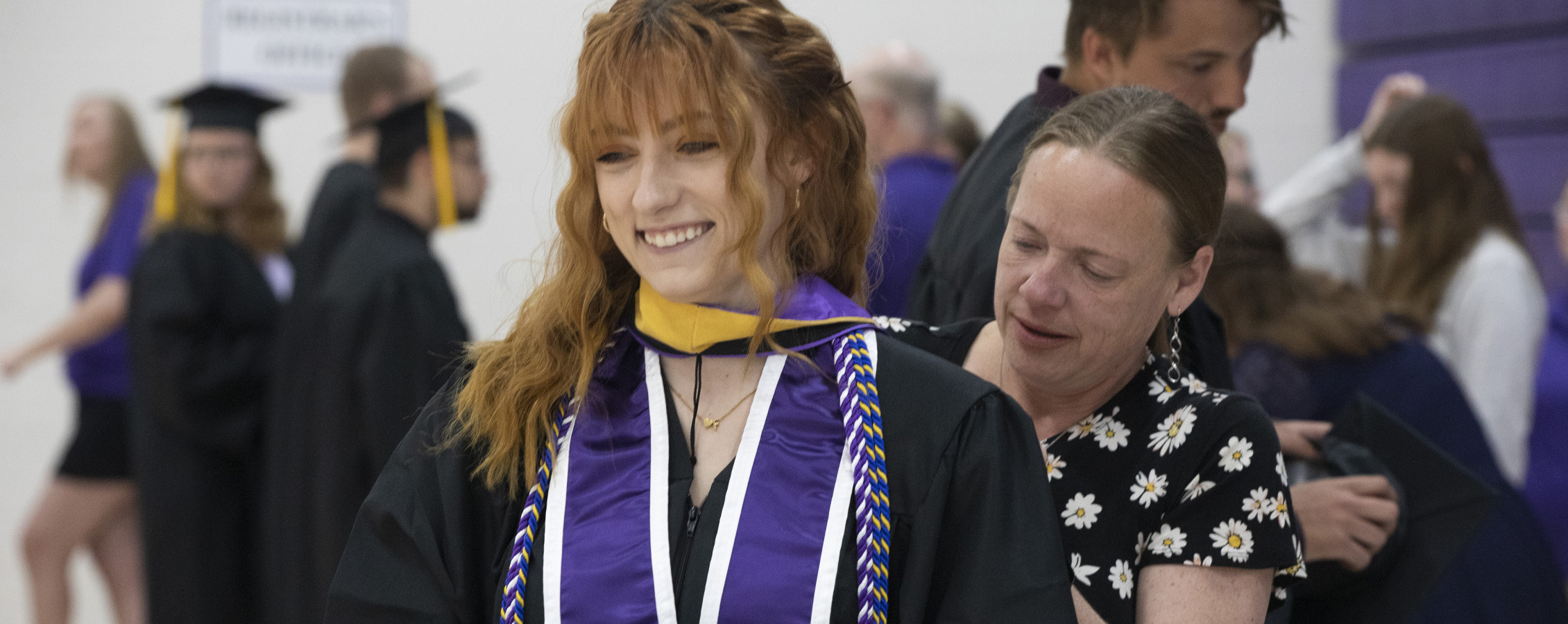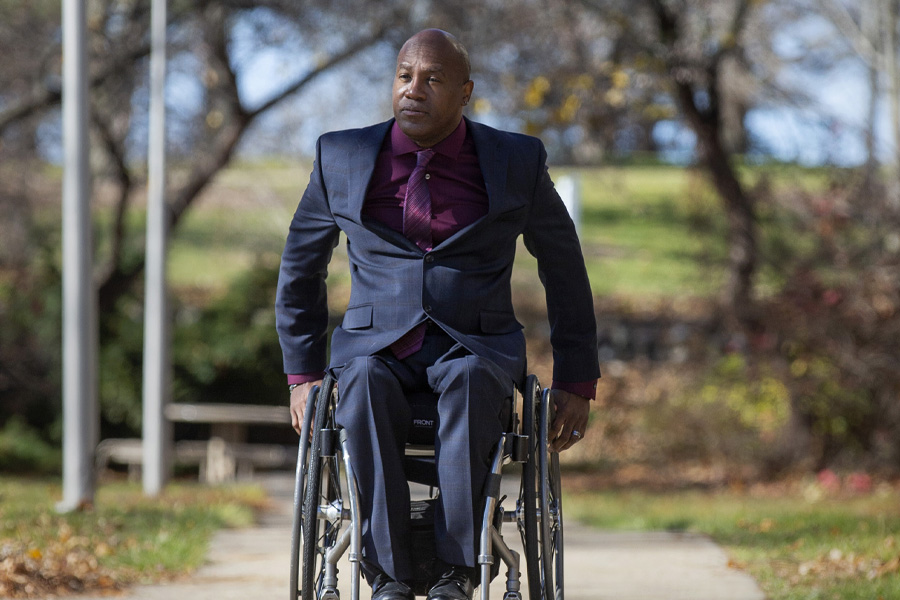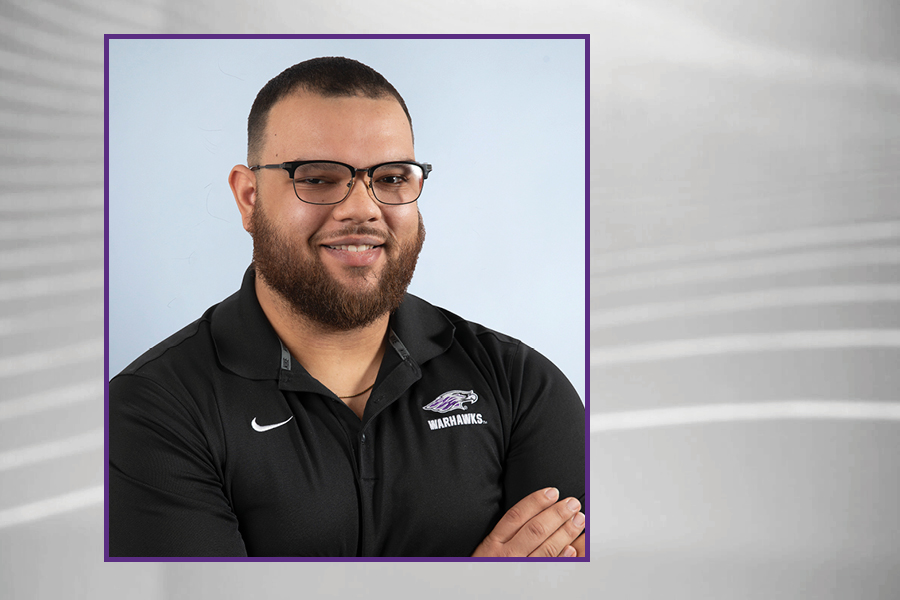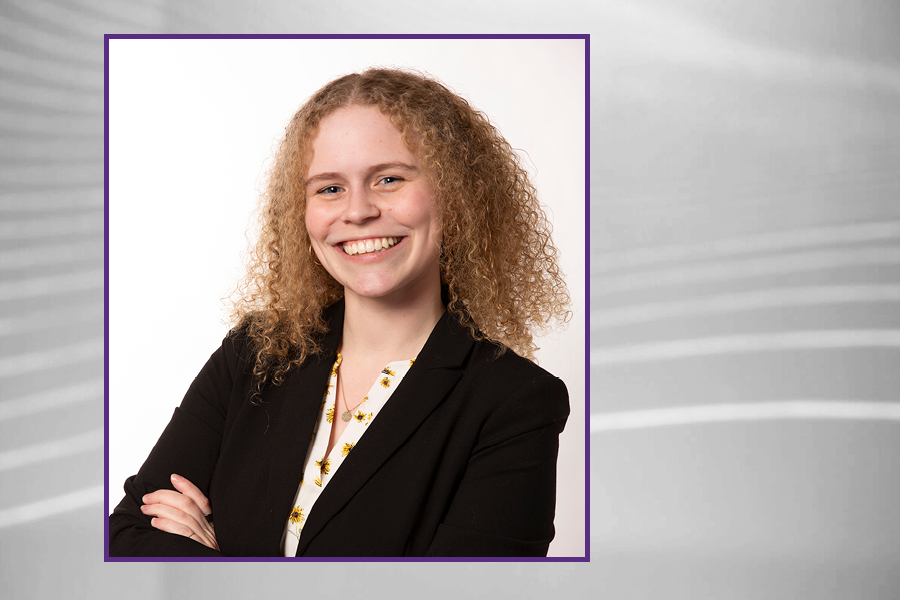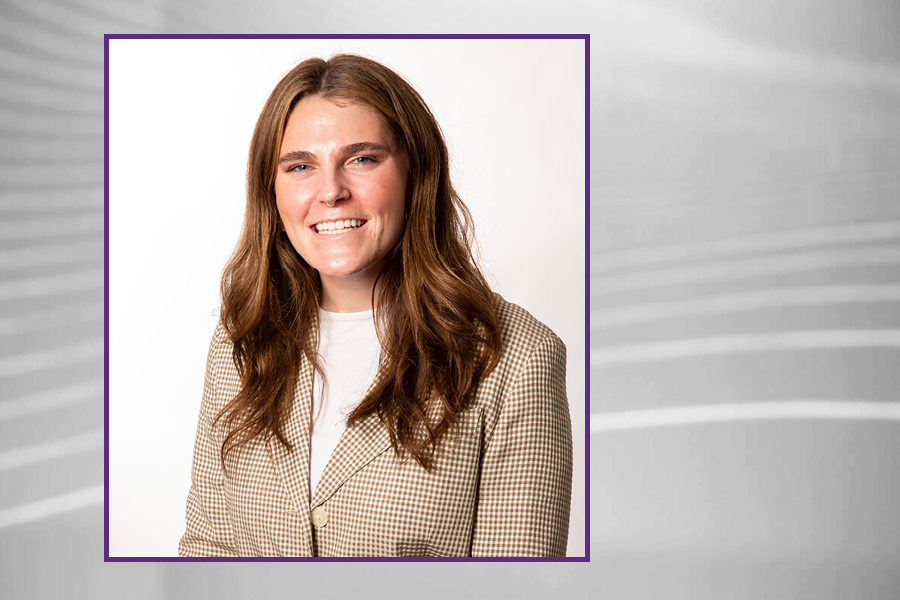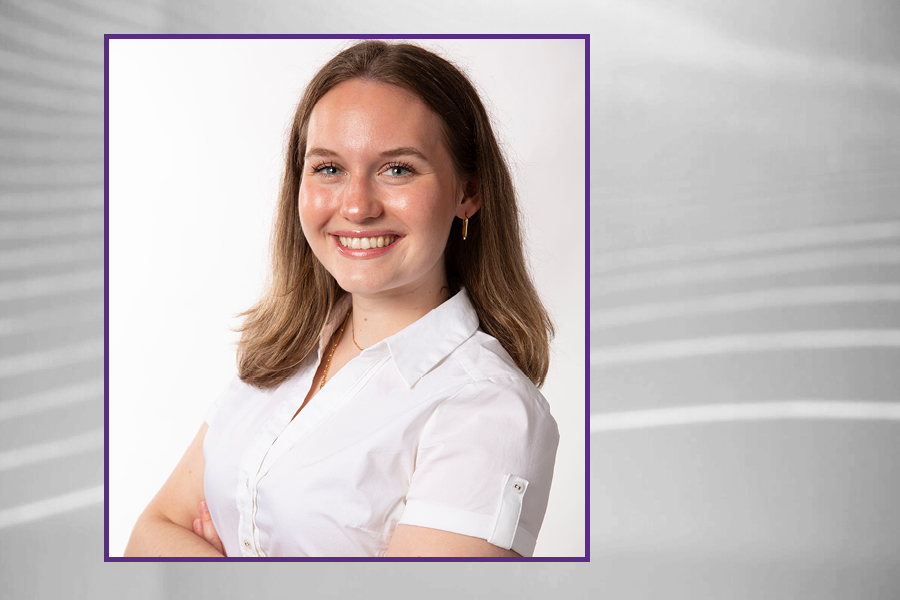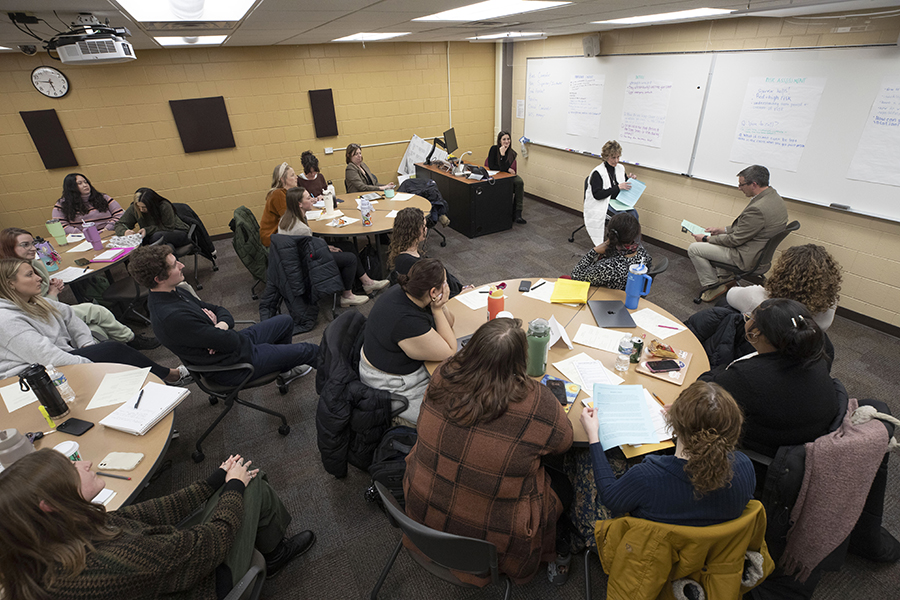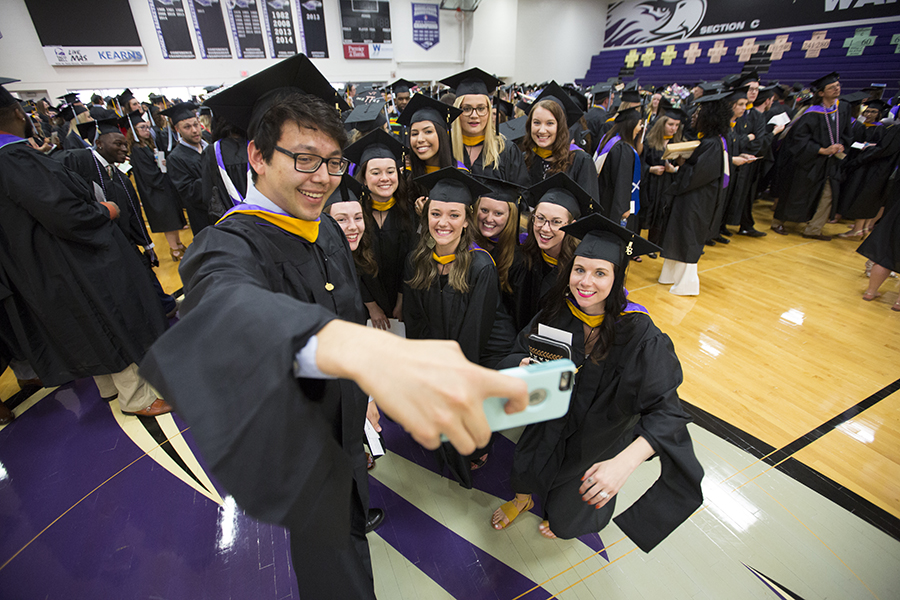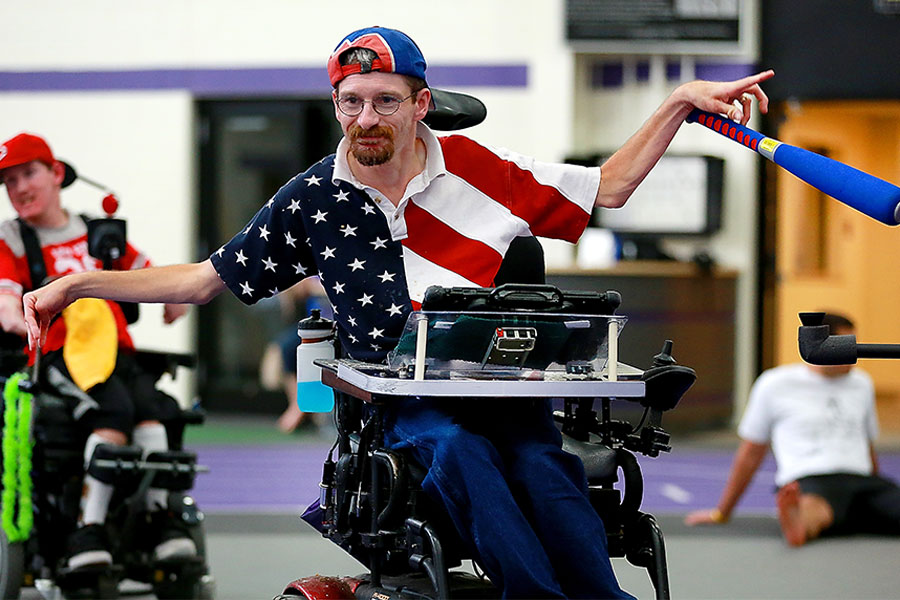SOCIAL WORK
Master's Degree Programs
Sharpen your skills to make positive change.
A Master of Social Work (MSW) from the University of Wisconsin-Whitewater prepares students to become advanced social work professionals equipped for a variety of social work jobs. Through our MSW degree program, we support students in achieving their goals — whether pursuing licensure as a Licensed Clinical Social Worker (LCSW) or engaging in other forms of advanced practice social work in urban and rural areas with diverse client systems, including clinical mental health and substance use treatment services, school social work, and community and policy advocacy.
Both our face-to-face and online MSW programs are fully accredited by the Council on Social Work Education (CSWE), ensuring a high-quality and accessible path to your social work degree. We’ll work with you to select coursework that aligns with your advanced generalist goals, preparing you to engage directly with clients and to critically address broader issues of social justice.
The job outlook for social workers is strong, with the profession expected to grow by 7 percent between 2023 and 2033. Additionally, there is a rising demand for mental health services both in Wisconsin and across the nation.
CAN WE BRAG A LITTLE?
Why Study Social Work at UW-Whitewater?
A hybrid learning environment
Since 2022, UW-Whitewater has offered an online Master of Social Work program, allowing you to complete all coursework virtually except for the field internship. Students enrolled in the online program enjoy all the same benefits as their face-to-face peers, including library and technology resources, involvement with student organizations like the Social Work Student Organization and Phi Alpha Honor Society, and support of the Center for Students with Disabilities and Dean of Students office. Classes in the online program are offered online, either asynchronously or synchronously. For the synchronous virtual classes, students are required to attend live class meetings at specific dates and times.
Face-to-face and synchronous virtual classes are offered on Tuesday, Wednesday and Thursday evenings, conveniently scheduled for students who are also working. Please note that field internships, required for all students, involve in-person internships for 12 to 16 hours per week during typical business hours, Monday through Friday.
Invested community partners, faculty-supported internships
Many social service agencies in Wisconsin are partnered with UW-Whitewater social work program to provide a high-quality social work field experience to our students. A supervised field experience provides students with opportunities to apply learned knowledge, values, and skills to real-life practice situations. Exposure to practice situations helps students grow their advanced generalist practice skills and prepares them to successfully work with a variety of client populations and systems.
Opportunities to build your skillset
In addition to the advanced generalist curriculum, our students have an option to pursue certificates in School Social Work, Substance Abuse Counseling, and/or Gerontology. With the completion of the School Social Work certificate or Substance Abuse Counseling certificate, students become eligible for the state licensure (School Social Worker or Substance Abuse Counselor-In Training).
A vibrant campus community
Located in southern Wisconsin within one hour of the state’s largest cities, Madison and Milwaukee, and within two hours of Chicago, UW-Whitewater is in close proximity to several of the region’s top organizations and agencies. We work closely with them to place students in internships and jobs.
Explore the Whitewater community »
What our Social Work students do

- Advance knowledge, cultivate strong professional values and ethics, and apply diverse prevention and intervention strategies through coursework, field education, and academic and professional advising.
- Apply research-based knowledge to inform professional practice
- Partner with community organizations to achieve shared goals through the use of evidence-based practices and interventions
- Promote and defend human rights while supporting marginalized and oppressed individuals, families, groups, organizations, and communities by applying a framework grounded in diversity, equity, and inclusion.
- Collaborate with faculty who are actively involved in social work practice, community service, and research.
What our graduates do
Careers: What can you do with an MSW?
Students with an MSW degree see a variety of career outcomes, including:
- Mental health counseling
- Substance use counseling
- School social work
- Geriatric social work
- Medical social work
- Military social work
- Case management
- Child and family social work
- Community organizer
- Policy advocate/analyst
Here are some of the places where our recent graduates have been hired:
- United Community Center of Milwaukee
- Counseling Speaks, Chicago
- Optum Health
- Forward Learning, Youth and Young Adults
- Crossroads Counseling
- JusticePoint
- Wisconsin Rapids Public Schools
- Advocate Aurora Health
- Mindstar Counseling
- Lad Lake
- Wisconsin School for the Deaf
- Dane County Juvenile Shelter
- Dane County Department of Human Services
- Merrill Area Public Schools
- School District of Janesville
- Middleton-Cross Plains Area School District
- Eau Claire Area School District
- Lac Courte Oreilles Ojibwe School
- Deerfield Community School District
- One City Schools
- Wausau School District
- Dane County Pretrial Services
- VitalCore Health Strategies
- Medford Area Public School District
- Jefferson County Human Services Department
Our Social Work faculty
Experienced and committed faculty and staff
We have faculty and staff committed to student success with research and practice experience in various social work fields. Our faculty infuses practical, evidence-based methods and skills into their teaching, while providing individual attention to the students. Our students also enjoy one-on-one advising for their coursework and field placements.
Want to learn more about the Master of Social Work graduate program?
262-472-1137 | msw@uww.edu
Program Coordinator: Kristen Prock | 262-472-5150 | prockk@uww.edu
Mission statement
The mission of the MSW program is to prepare students to be advanced social work professionals skilled in developing collaborative relationships and implementing evidence-based interventions, building on their knowledge in liberal arts, person-in-environment approach, and scientific inquiry. Through this preparation, students develop advanced practice, intervention and evaluation social work skills to work within dynamic local, regional, and national contexts to address diverse human and community issues affecting the quality of life and to promote social, racial, economic, and environmental justice.
The UW-Whitewater Master of Social Work (MSW) program offers an Advanced Generalist curriculum that prepares students for diverse fields of social work practice, including clinical social work.
For more details of the curriculum and the required courses:
Advanced Standing
Applicants with a Bachelor of Social Work (BSW) from a CSWE-accredited undergraduate program who meet additional criteria may qualify for Advanced Standing, allowing them to bypass foundational generalist coursework.
Graduate certificates:
Students may choose to add a certificate as a part of their MSW program.
- Gerontology
- School Social Work (Students pursuing School Social Work licensure are required to add this certificate)
- Substance Abuse Counseling
Post-MSW School Social Work certificate:
UW-Whitewater may offer a School Social Work program for students who have already obtained an MSW but are interested in school social work. Please note that the Post-MSW School Social Work program is not offered every year. We recommend contacting the program coordinator to confirm its current availability.
Social Work Licensure:
By completing specific program requirements, students may meet the educational qualifications for various social work licenses or credentials, such as Licensed Clinical Social Worker (LCSW), School Social Worker, or Substance Abuse Counselor (SAC). Additional examinations, supervised practice, or other requirements may be mandated by the professional licensing or certifying body. To learn more about the educational requirements for social work licensure in different states, please see Professional Licensure Disclosures.
Minimum requirements
- Transcript demonstrating a bachelor's degree from a 4-year college or university accredited by a recognized regional accrediting association
- Students who have a BSW degree from an accredited undergraduate social work program are eligible for the advanced standing
- Students pursuing a School Social Work license must choose the School Social Work certificate in their application.
- Minimum GPA of 2.75 on a 4.0 scale (you may apply if your GPA is less than 2.75, but you would be placed on probation status if admitted)
- School Social Work certificate program applicants need to have a minimum of a 3.0 GPA for all of their undergraduate coursework, including transfer courses and courses taken at any post-secondary institution, and cannot be admitted to the program on a probationary status. For advanced-standing students, a minimum GPA of 3.0 is required in all core social work courses
- Completion of an Introductory statistics course (200-level or higher) with a grade of C or better (this prerequisite may be taken at UW-Whitewater the term before your MSW program begins).
- Personal statement [PDF] and resume
- 3 positive references
- If you graduated in the last 5 years:
- At least one academic reference (i.e., reference from an academic instructor);
- One academic reference or a professional reference (i.e., reference from field internship, volunteering, or work); and,
- The third reference can be an academic reference, a professional reference, or a personal reference
- If you graduated more than 5 years ago:
- One academic reference or a professional reference;
- One academic reference or a professional reference; and,
- The third reference can be an academic reference, a professional reference, or a personal reference
- Note: A reference from a family member is not permitted
- If you graduated in the last 5 years:
- Background check to be completed prior to your field placement. It is not part of the application process (unless you are pursuing school social work).
Instructions for applying
- Apply by the application deadline
- Apply online through the School of Graduate Studies
- Prerequisite courses, such as Statistics, may be taken at UW-Whitewater the term before your admission to the MSW program.
- The GRE test is NOT required for the MSW program application.
Advanced Standing for international students
Advanced standing is awarded to graduates holding degrees recognized through its International Social Work Degree Recognition and Evaluation Services or covered under a memorandum of understanding with international social work accreditors. To apply for the International Social Work Degree Recognition and Evaluation Services, please see the International Degree Review.
Students in the Master of Social Work program at UW-Whitewater have multiple opportunities to offset the financial costs of enrollment. All graduate students can seek financial assistance in the form of assistantships, employment, grants, and loans.
Scholarships and fellowships

